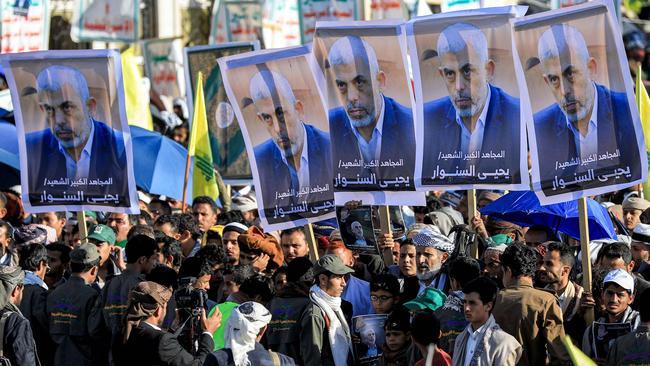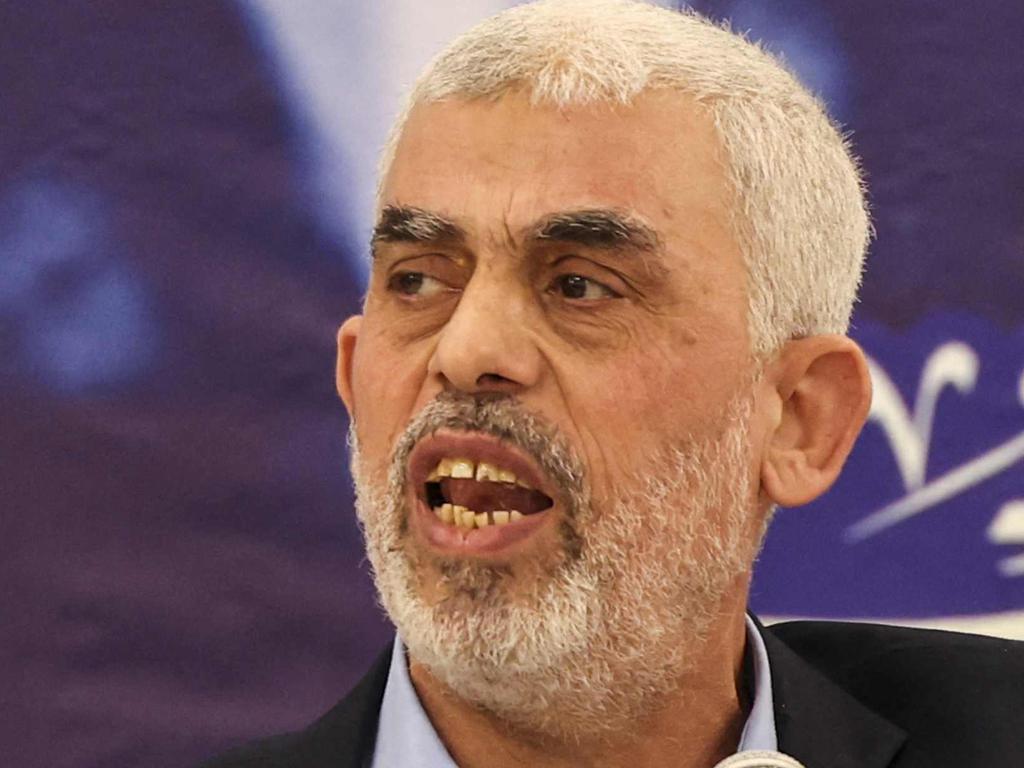In death, Hamas leader may have won wider support than when he was alive
The way Yahya Sinwar died made him a hero in the Arab world; governments across the region are watching for a surge in pro-Palestinian protests urging them to take a tougher line on Israel.

For more than a year, Mustafa Muhammed, a displaced Palestinian, had sensed other Gazans living in tents there turning against Yahya Sinwar, the Hamas leader who orchestrated the Oct. 7 attack on Israel. Some people sleeping on the street or among the debris of their homes after waves of Israeli bombardments were growing openly scornful, he said.
That is, until Sinwar was killed – not deep in a tunnel, or fleeing Gaza, as many people suspected would be the case, but dying in an encounter with Israeli soldiers in the south of the strip. Sinwar’s final moments were on display in a video released by Israel that apparently showed the Hamas chief critically injured, throwing an object at a surveillance drone shortly before his death. When Gazans saw the footage, many changed their minds, Muhammed said.
“It showed he was fighting until the very end,” he said.
Sinwar’s actions as one of Hamas’s top operatives, and especially last year’s attack on Israel, divided opinion across the Palestinian territories and wider region. Designated as a terrorist by the U.S., he had been convicted of multiple murders in Israel, including the killing of Palestinians he considered to be collaborators, and was serving a prison sentence there before he was released in a prisoner exchange.
Only 29 per cent of Palestinians in Gaza were satisfied with Sinwar, according to September polling from the Palestinian Center for Policy and Survey Research. But the way he died has prompted a reappraisal among many Palestinians and Arabs, and it is putting some governments in a bind as they measure their own responses to his death.
Key U.S. allies Saudi Arabia, Jordan and Egypt are in a particularly delicate position, analysts say. Swathes of their populations are sympathetic to the Palestinian cause if not Hamas itself, while their governments have either at points designated Hamas a terrorist group or are wary of its influence and connections to Iran.
“The manner of Sinwar’s death puts those countries in a tight spot at a sensitive time,” said Mouin Rabbani, a nonresident fellow at the Center for Conflict and Humanitarian Studies, an independent research centre based in Qatar. “The people’s attitudes toward their governments have been, ‘You haven’t been able to achieve anything through diplomacy, while movements much weaker than you like Hamas and Hezbollah are causing Israel grief.’”
“They are critical that their leaders don’t have an effective strategy and are relying on the U.S. and Europe to put an end to this, which they feel is an admission of impotence,” Rabbani added.
This quandary explains why the regional players have responded to Sinwar’s death in very different ways.
Some, like Iran, Hamas’s biggest state supporter, have lionised him. Saudi Arabia, in contrast, has used its influence over the country’s media arm to call Sinwar a terrorist and welcome his death, drawing a wave of protests, including the vandalism of a Saudi channel’s offices in Iraq, according to Saudi officials.
Officials from Egypt and Jordan – both having diplomatic relations with Israel and the latter having a significant Palestinian population – have mostly stayed quiet publicly. “They are going out of their way to not issue a direct response to this topic,” Rabbani said.
The U.S. was less equivocal, with President Biden saying Sinwar’s death was “a good day for Israel, for the United States, and for the world,” while French President Emmanuel Macron said it represented an opportunity to de-escalate the conflict in Gaza and called for the release of the remaining hostages taken from Israel on Oct. 7, 2023.
This upswell of support for Sinwar in the Middle East, apparent across social media and in some street demonstrations, has little to do with last year’s attack on Israel, which killed around 1,200 people and triggered a devastating Israeli response. Rather it reflects the symbolism of his decision to stay in Gaza for the war instead of orchestrating it from Qatar, where Hamas’s political leadership resides, or fleeing to neighbouring Egypt, said Nasser Alkidwa, a former Palestinian foreign minister.
“It makes a difference to people in the Arab world that he was above ground, that he didn’t escape, and that he was fighting,” Alkidwa said. “How and where he died also refutes the Israeli narrative of Sinwar abandoning the people of Gaza. And many people feel Israel can’t pretend this is a big achievement because his killing wasn’t planned or done through using intelligence.”
The drone footage released by Israel appears central in this shift in sentiment toward Sinwar, said Gershon Baskin, a former Israeli hostage negotiator who is now Middle East director of the diplomacy advocacy group, International Communities Organization.
That video shows a badly damaged building littered with dust and debris, exposed wires and scattered furniture. It also shows a man, which the military said was Sinwar, sitting motionless with his back to the drone, in a chair, his face covered with a cloth.
His arm appeared to be severely wounded. Then suddenly he heaved a piece of wood at the drone, attempting to bring it down, but he failed. The video provided by the military ended at that point, and Sinwar was killed as a tank fired on the building soon after.
A senior Arab official involved in ceasefire negotiations said they were surprised Israel released the footage, as it could contribute to a continuing defiance among the Palestinian public as well as militants in Gaza. Baskin, the former Israeli negotiator, said Israel didn’t seem to account for how the release of the drone footage could invigorate not only the Palestinian public but much of the region.
“The Israeli political system has no awareness whatsoever – and they don’t care – what the message is to the Arab world,” Baskin said. “This is Netanyahu selling himself, pursuing his political survival, and saying, ‘I am the hero, I killed Nasrallah, I killed Sinwar.’ Israel is signalling, ‘[Militant leaders] are never out of our reach and we will get to every single one of them.’” The Israeli prime minister’s office declined to comment on the video and the military didn’t respond.
The question likely troubling governments across the region is how to react if there is a surge in pro-Palestinian protests urging them to take a tougher line on Israel.
Jordan, a kingdom with restrictions on speech and assembly, has generally tolerated frequent pro-Palestinian protests over the past year, including some where protesters have chanted pro-militant slogans while waving Hamas flags. Jordan is likely trying to avoid the unrest a crackdown on protests could create, analysts say. Other countries are less lenient.
Saudi Arabia, which effectively bans any form of protest, has sporadically arrested people for demonstrating for the Palestinian cause while carrying Palestinian flags over the past year, according to Saudi officials. The kingdom, which is seeking the normalisation of relations with Israel, is concerned that support for the Palestinians could spark political unrest and radicalise young Saudis, the officials said.
Egypt, an authoritarian state that is also a negotiator between Israel and Hamas, has arrested at least 120 people in recent months for protesting in support of Palestinians, fearing that small protests could quickly turn into a movement calling for a change of government in Cairo, according to Egyptian officials.
Pressure is building, however.
Some religious leaders have made statements praising Sinwar. The Grand Mufti of Oman called Sinwar a heroic leader. “Blessed is he for having died advancing forward without retracting back while fighting,” his statement said.
An influential Islamic-Egyptian institution, Al-Azhar University, issued a strong statement following Sinwar’s death, praising Palestinian resistance and criticising the labelling of those involved in it as terrorists. It was also critical of Arab states that back Israel.
Even one of Hamas’s most bitter rivals in the Palestinian movement, the Fatah party that governs the West Bank, on Friday said it mourned Sinwar. It called him a “martyr” and said his death wouldn’t dissuade the Palestinian people from pursuing freedom.
Dow Jones





To join the conversation, please log in. Don't have an account? Register
Join the conversation, you are commenting as Logout